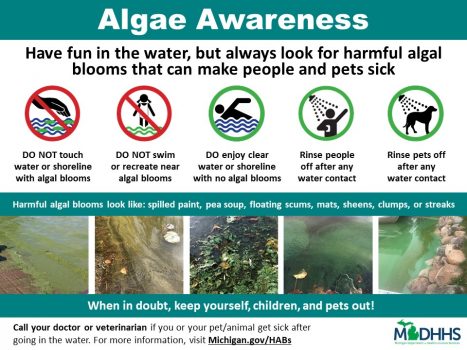
July 9, 2020 –Western Upper Peninsula Health Department received test results from samples collected by the Department of Environment, Great Lakes, and Energy (EGLE) indicating that the algal bloom in Portage Lake, Portage Canal, and Torch Lake in Houghton County did not contain harmful toxins. The three samples of the algae that were collected tested negative for Microcystin, Anatoxin-A, and Cylindrospermopsin. Based on these negative test results and dissipating bloom the public health advisory has been lifted.
Cyanobacteria also known as blue-green algae causes algal blooms and are a natural part of lakes, rivers, and ponds. An algal bloom in Portage Lake, Portage Canal, or Torch Lake is an unusual occurrence. The exact cause of the initial algal bloom is unknown. However, it is thought that the warm weather, lots of sunlight, and usually warm water temperature are contributors to the condition.
Blooms can disappear and reappear, as well as turn their toxin production genes on and off. You cannot assume that the bloom is “toxin-free” all the time based on one test. The toxicity of the cyanobacteria changes over time and the cyanobacteria itself is capable of causing a reaction regardless of toxins. Skin contact with water containing cyanobacteria may cause irritation such as rashes, hives, or skin blisters. It may also cause runny eyes and noses or asthma-like symptoms.
Regardless of the test results, it is always recommended to avoid recreating in any discolored or scummy waters (for both people and pets). Clear water, away from any discoloration or scums, has consistently been shown by years of EGLE testing at many Michigan lakes, to have no detectable toxins or at very low levels not considered a health risk. Clear water can be safely used for recreational swimming and boating. People and pets should continue to avoid direct body contact and avoid swallowing water in areas where these algal blooms are present.
Algal blooms look like spilled paint, pea soup, floating scum, mats, green sheens, clumps, or streaks. Swimming, wading and water activities that create spray are not recommended in the areas where this is visible. Do not let dogs drink affected water. Monitor children and pets closely to ensure they do not eat or play with algae on the shoreline. If people and dogs enter the affected water, rinse them off and monitor for illness.
If people may have had contact with or swallowed affected water and feel sick, they should consult with their doctor or Poison Control at 800-222-1222. If symptoms are severe, people should get emergency medical attention. If animals become sick after contact with lake water, contact your
veterinarian immediately.
The public is asked to continue reporting if the algal bloom is present or grows dramatically in size. EGLE will evaluate retesting of blooms on an individual basis, taking into account how much of the waterbody is covered by the bloom, and if it is impacting recreational areas such as public boat
launches or swimming beaches.
Suspicious-looking algae can be reported to EGLE by calling the Environmental Assistance Center at 1-800-662-9278 or sending an e-mail to AlgaeBloom@Michigan.gov. More information on harmful algal blooms can be found at www.michigan.gov/habs
Local beaches are monitored and tested for E. Coli bacteria by the health department on a weekly basis. Testing results as well as any beach advisories or closures can be found by visiting the BeachGuard website.
